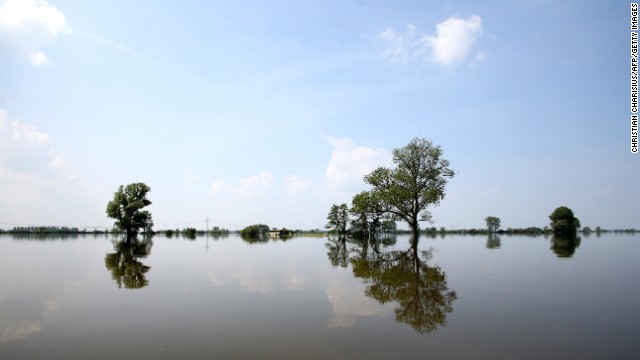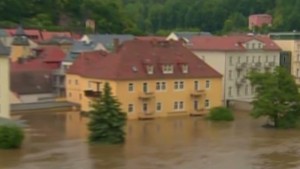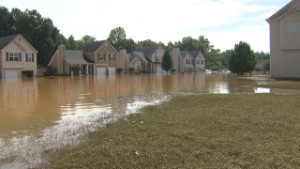Thousands more forced from home by Germany flooding

Trees are submerged in the waters of the Elbe River in Schoenhausen, Germany, on Wednesday, June 12. Heavy rain has left rivers swollen across Central Europe.
Stendal, Germany (CNN) -- Floods continued to devastate communities alongside the surging River Elbe in Germany's northeastern Saxony-Anhalt state Wednesday.
Hundreds of people are being evacuated from their homes in the towns of Stendal and Aken, with the army using helicopters and amphibious vehicles to help move them to safety.
"One-hundred-and-fifty people refused to be evacuated, but were forced to leave their homes by authorities," a spokesman for Saxony-Anhalt's Interior Ministry in Magdeburg said.
The evacuation process is still under way.
In total, 45,000 people have been asked to leave their homes in Saxony-Anhalt, the state currently worst affected by the flooding. About 11,500 rescue workers are operating in the area.
 Animal
park swamped by flood waters
Animal
park swamped by flood waters
 Germany
reeling from record floods
Germany
reeling from record floods
 A
look at flooding across Europe
A
look at flooding across Europe
 Health
risks from floods
Health
risks from floods The village of Fischbeck, about six miles from Stendal, is completely flooded after a nearby dike was breached.
Efforts to repair the dike have failed despite the deployment of two army helicopters to drop giant sand bags. Police who turned back a CNN team who tried to reach Fischbeck described the situation as critical and dangerous.
Although the water level around Stendal is already falling, the water continues to flood villages downstream such as Klietz and Wust.
Soldiers can't hold back the water
"We expect the water to devastate further cities. Consequently we are trying to build new emergency dikes to stop the floods," said a spokesman for Saxony-Anhalt's interior ministry.
Annette Friedebold, the owner of an animal park in Weissewarte, told CNN how she'd been forced to evacuate most of the 400 animals housed there, starting last Tuesday.
"We built small evacuation islands for the animals that had to stay. Fortunately, all of them survived the flooding. But it is going to take at least three months until everything will be rebuilt," she said.
The flooding is the worst she has seen in more than 30 years working in Weissewarte. The village lies about 3.5 miles from the River Elbe, which is swollen from heavy rains at the start of the month.
Record water levels along the Elbe as it makes its way to the North Sea have caused flooding in the Czech Republic, as well as eastern and northern Germany.
Friedebold, who now has to travel through the park by boat to check on those animals who were left there, expects her park to be flooded for weeks to come.
Like many other people in the affected regions, Friedebold hopes to receive donations.
"In 2002, when the last big flooding occurred, we thought we would have to file for bankruptcy. But we were lucky because a lot of people were there to help us," she said. "A lot of our animals are still shocked and scared. But they have to be strong now."
Among the creatures still in the park are wild pigs and lynx. The latter sought refuge in the trees when the flood waters came.
"I still cannot believe what the water has done to me and my park," Friedebold said.
The crest on the River Danube, which has also brought flooding to southern Germany, Austria and Slovakia, is expected to reach southern Hungary on Wednesday and the country's southwest a day later.
Serbia is preparing for the Danube's waters to peak there in the next four days.
http://www.cnn.com/2013/06/12/world/europe/europe-flood/index.html